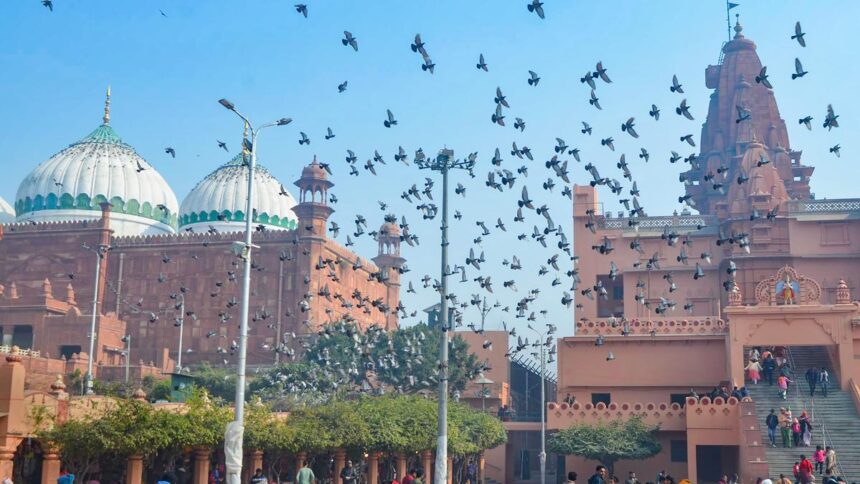
Pigeons fly near the Sri Krishna Janambhoomi and Shahi Idgah mosque, in Mathura.
| Photo Credit: PTI
The Supreme Court on Thursday (December 12, 2024) directed the Union government to file its counter-affidavit within four weeks. “We want the Union goverment’s response to be on record. Most of the issues here is legal,” Chief Justice of India Sanjiv Khanna said.
Solicitor General Tushar Mehta, appearing for Centre said he needs time to respond to the petitions challenging the Places of Worship Act.
The Supreme Court was hearing a series of petitions challenging the validity of the Places of Worship (Special Provisions) Act of 1991, a statute that has protected the identity and character of religious sites as they existed on August 15, 1947.
Explained | The legal dispute over Varanasi, Mathura mosques
The Special Bench was headed by Chief Justice of India (CJI) Sanjiv Khanna and also comprised Justices P.V. Sanjay Kumar and K.V. Viswanathan.
Mr. Khanna also said the top court will hear the parties out, especially with regard to what has been ruled in the 2019 Ramajanmabhoomi judgment, and says that no further civil suits will be registered till the next date of hearing. In the case of pending suits, the courts will not pass any effective interim or final orders till the next date of hearing, it added.
Faced with objections from petitioners’ lawyers in court, the Chief Justice said that there is little value in civil courts passing orders, as the Supreme Court is set to comprehensively hear and decide the full scope of the Places of Worship Act, particularly Sections 3 and 4, which preserve the character of religious places of worship as they existed on August 15, 1947.
The case involves a slew of petitions challenging the legality of the 1991 Act. The petitioners, including advocate Ashwini Kumar Upadhyay, blame the 1991 law for barring Hindus, Jains, Buddhists, and Sikhs from approaching courts to “re-claim” their places of worship which were allegedly “invaded” and “encroached” upon by “fundamentalist barbaric invaders”.
Also Read: The salience of the Places of Worship Act and the Gyanvapi precedent
Muslim organisations such as the All India Muslim Personal Law Board (AIMPLB) and the Jamiat Ulama-i-Hind, however, have countered. They say that these pleas, in the guise of public interest petitions, cannot challenge a Central legislation which has guarded the spirit of fraternity and secularism, virtues from the Preamble of the Constitution, as well as parts of the “basic structure” of the Constitution, through the protection of the religious character of religious places.
However, the Union Government is yet to file its counter-affidavit in the matter, despite several extensions given by the court.
The matter will be heard in the backdrop of several suits filed in various courts, including those related to the Gyanvapi Mosque in Varanasi, Shahi Idgah Mosque in Mathura and Shahi Jama Masjid in Sambhal, claiming these were built after destroying ancient temples and seeking permission to allow the Hindus to offer prayers there.
Published – December 12, 2024 04:19 pm IST







